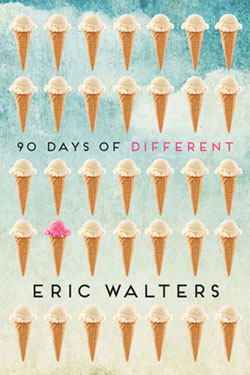| ________________
CM . . .
. Volume XXIV Number 7. . . .October 20, 2017

 |
90 Days of Different.
Eric Walters.
Victoria, BC: Orca, 2017.
303 pp., hc., pdf & epub, $19.95 (hc.).
ISBN 978-1-4598-1673-2 (hc.), ISBN 978-1-4598-1674-9 (pdf), ISBN 978-1-4598-1675-6 (epub).
Grades 8 and up / Ages 13 and up.
Review by Charlotte Duggan.
* /4
|
| |
|

excerpt:
“Okay, so what’s today’s different going to be?” I asked as Ella and I drove along.
Isn’t it a bit obvious from the way I asked you to dress?”
I was, as requested, wearing running clothes and sneakers.
“I’m smart enough to figure it’s some sort of running thing. And judging from the way you’re dressed-heels, a skirt and full made up-I’m also assuming you’re not going to be joining me on this one,” I said.
“Think of me as cheering you on from the sidelines. Soph, you know how I feel about running. I only do it if something is chasing me or I’m chasing something. Remember what I said that if a bear was chasing me I’d run very fast but if I was chasing Shawn Mendes, I’d run even faster.”
Eric Walters’ 90 Days of Different is like Jessica Brody’s 52 Reasons to Hate My Father, but without any of the fun. Like 52 Reasons, 90 Days of Different is structured around a thin premise requiring some fast suspension of disbelief. But the lack of interesting characters and inauthentic dialogue results in a very dull read.
The story begins on the last day of high school. While everyone around Sophie Evans is whooping it up and celebrating, she’s getting dumped by her boyfriend. Luke is straightforward about his reasons: she’s boring and he wants more adventure. In steps best friend Ella with a plan – not to win the boyfriend back, but a plan to overhaul Sophie’s life. Because even though Ella dislikes the bad boyfriend, she agrees that Sophie is boring and predictable. Ella calls her plan the “Surprise Summer of Sophie”. She tells Sophie, “This summer is going to be about unpredictable, out of control... you’ll do whatever I arrange for the next eighty-nine days...”.
Each chapter is a new “different” that Ella arranges and then springs on Sophie. One night the girls join a zombie “Thriller” flash-mob dance, on another day Sophie has acrylic nails applied and painted with tiny tuxedos, and on another she rides a mechanical bull. Sophie and Ella crash a wedding, go to a topless beach, and Sophie gets a tattoo. Sophie blogs and tweets and posts on Instagram about each new different and what she discovers about herself and others: “I’d found out that cowboys and cowgirls…were just people like Ella and me”. After a “different” that doesn’t go well, Sophie learns that “It wasn’t that bad to be bad at something, and being bad together had just made it better.” A day at a homeless shelter inspires Sophie to observe “how much we have in our lives and how so often we’re not really grateful for it”.
And herein lies the problem. While the activities Ella plans seem entertaining enough, Sophie’s reflections are just too banal to propel the plot along. Her insights may even accurately reflect the thinking of a 17-year-old, but they fail to have the intended impact.
Unlike the spoiled Alexis from 52 Reasons to Hate My Father, Sophie is not a selfish princess. She’s is smart, beautiful and conscientious. But where Jessica Brody created a self-absorbed character we loved to hate while anticipating her inevitable transformation, Walters has given us a character who really has nowhere to grow. Sophie is already perfect – just uninteresting.
In part, this may reflect Walters’ failure to nail what is possibly the biggest writing challenge of all: teen girl-speak. As readers know, the vocabulary of this cohort shifts and morphs as quickly as you can click send on Snapchat. Pinning it to the page so that it sounds authentic requires a finely tuned ear. Unfortunately, Sophie’ internal narrative and the dialogue in general, just don’t sound realistic.
Walters does succeed in capturing our emotional interest in the heart-melting scene when Sophie visits her mother’s grave for the first time since she died over ten years ago. The scenes including Sophie’s loveable but incompetent father and her bratty but loveable brother have been awkward and unreal. But in the immediate aftermath of the cemetery visit, we observe Sophie connect with her father, get in touch with her grief, and gain genuine insight into her character. Unfortunately it is too little too late.
Not Recommended.
Charlotte Duggan is a teacher-librarian in Winnipeg, MB.

© CM Association
CC BY-NC-ND
Hosted by:
University of Manitoba
ISSN 1201-9364
|
This Creative Commons license allows you to download the review and share it with others as long as you credit the CM Association. You cannot change the review in any way or use it commercially.
Commercial use is available through a contract with the CM Association. This Creative Commons license allows publishers whose works are being reviewed to download and share said CM reviews provided you credit the CM Association. |
Next Review | Table of Contents for This Issue - October 20, 2017.
CM Home | Back Issues | Search | CM Archive | Profiles Archive
|
